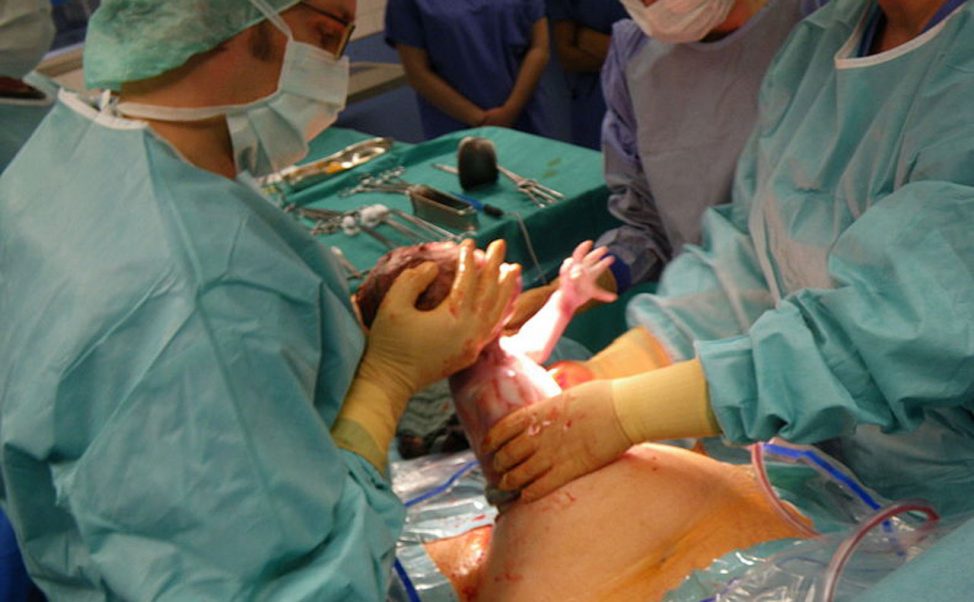According to a study of more than 20 million children, babies born by caesarean section are more likely to be autistic or develop attention deficit hyperactivity disorder (ADHD).
Research found C-section babies have a 33 per cent higher chance of autism and are 17 per cent more likely to get ADHD.
But scientists are in disagreement about whether the birth actually has anything to do with the disorders, or if both are consequences of deeper issues. In their paper the researchers suggested that not being exposed to bacteria in the vaginal canal or experiencing the natural stress response during a normal birth may affect the brain’s development.
Experts not involved in the study, however, said it’s more likely that caesareans are needed because of underlying factors which could themselves be linked to autism.They said there is ‘good evidence’ that C-sections do not directly cause autism and that parents should not be afraid of the procedure.Caesarean births have tripled around the world in 30 years, with more than one in five children now born via the operations, up from six per cent in 1990.
The researchers suggested the ideal proportion of caesarean births was between 10 and 15 per cent – the rate is around 25 per cent in the United Kingdom (UK). The procedure involves cutting across the abdomen and surgically removing the baby, instead of the baby being pushed out through the vagina.
C-sections are most often done to protect the health of the mother and baby, but women can also choose to have them for cultural reasons or if they’re afraid of giving birth naturally.
Studies have already shown babies born this way are more likely to become obese, suffer from allergies, or develop asthma, type 1 diabetes or leukaemia.Evidence of links between C-sections and psychiatric disorders, however, is “incomplete”, according to the team from Sweden’s Karolinska Institutet.
Led by PhD student Tianyang Zhang, they analysed the results of 61 past studies which recorded details of 20,607,935 births in 19 countries. They found children born via C-section were a third more likely to be diagnosed with autism and 17 per cent more likely to be diagnosed with ADHD, compared to children born in a vaginal birth.
These results remained the same whether the C-section had been done for medical reasons or chosen by the mother, they said.The causes of autism are not well understood and there are believed to be various genetic factors which contribute to the condition.
Past studies, Ms Zhang’s team wrote in their paper, suggested not being exposed to bacteria in the vaginal canal could stop the babies’ immune systems from developing properly, potentially leading to problems in the brain.
And sensory development may be affected by the lack of the natural stress response during birth, they added. But experts not involved with the paper said these were unlikely and the results should not put mothers or doctors off opting for caesareans. Kings College London’s Prof. Andrew Shannan said: “The need for caesarean is often caused by problems that could influence brain function, such as a poorly functioning placenta.
“It is highly unlikely the caesarean delivery itself is causal in these mental health conditions, from our current understanding of brain physiology and the effects of caesarean.
“Women should not be alarmed by the need for a caesarean which is often performed to reduce risk to their baby.” Ms Zhang’s team suggested proving a link between C-section and damage to the brain could lead to reducing rates of unnecessary caesareans.
They said: “Public health concerns have been raised because… unnecessary cesarean deliveries may be performed in [high-income countries]. “Despite being a life-saving procedure in the presence of complications, no evidence, to our knowledge, indicates that cesarean delivery, if not [done for medical reasons] is beneficial for the offspring.” The team admitted children most likely to need to be born by C-section may also just be those most likely to develop autism or ADHD regardless.
Babies born by C-section 33% more likely to develop autism, attention deficit disorder -Study






